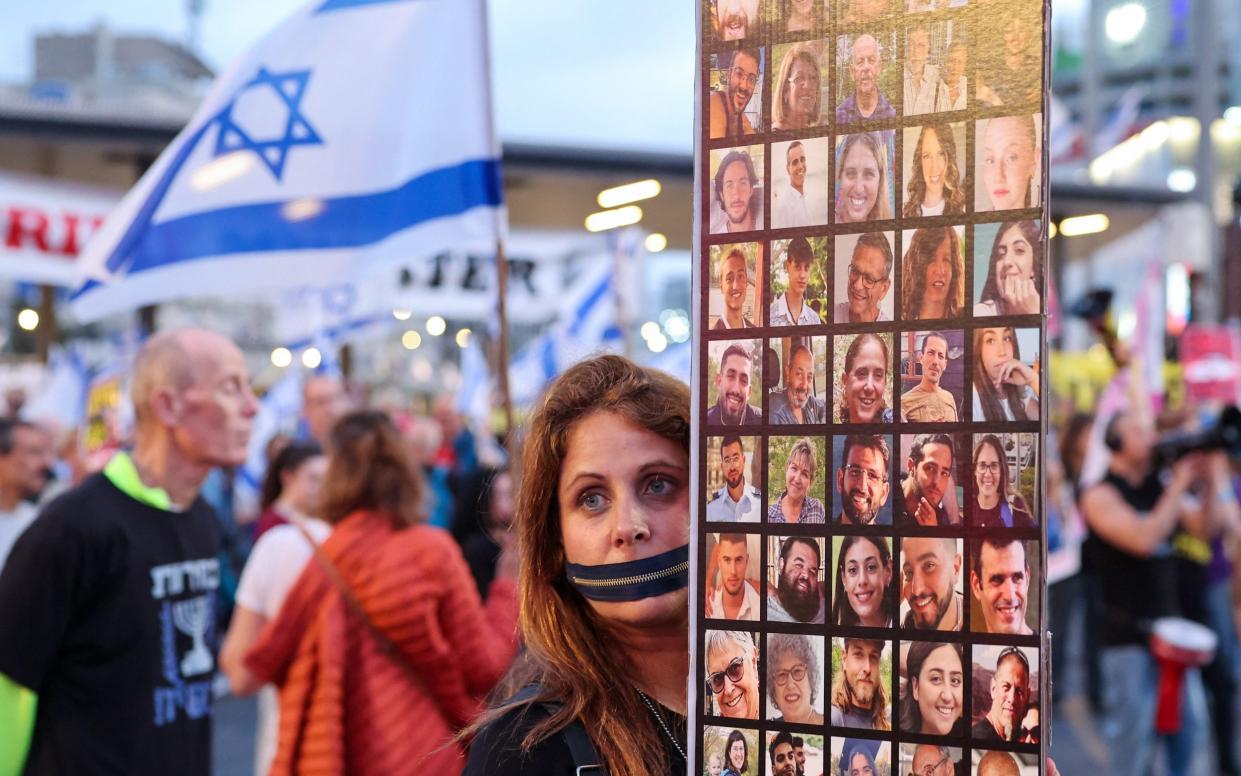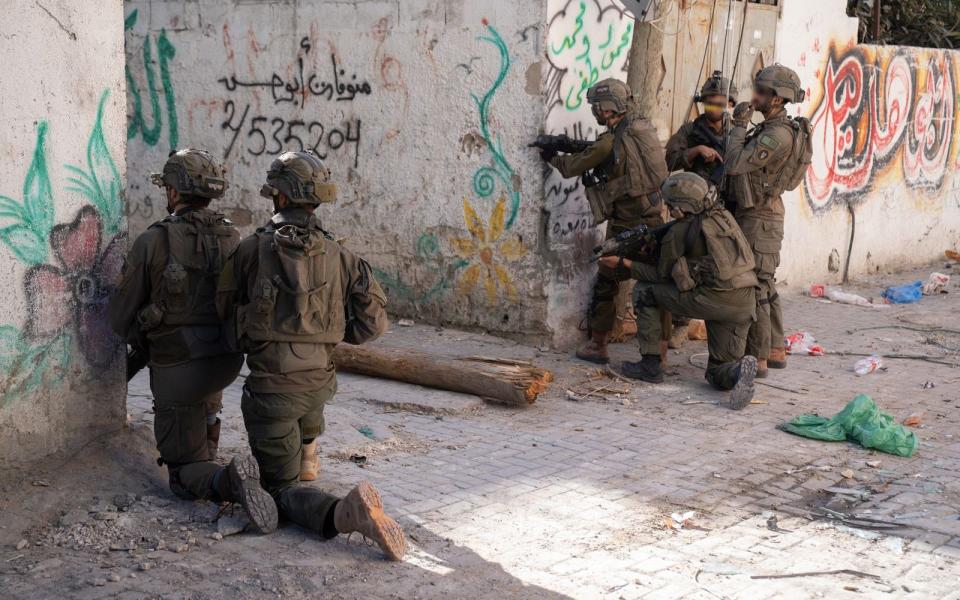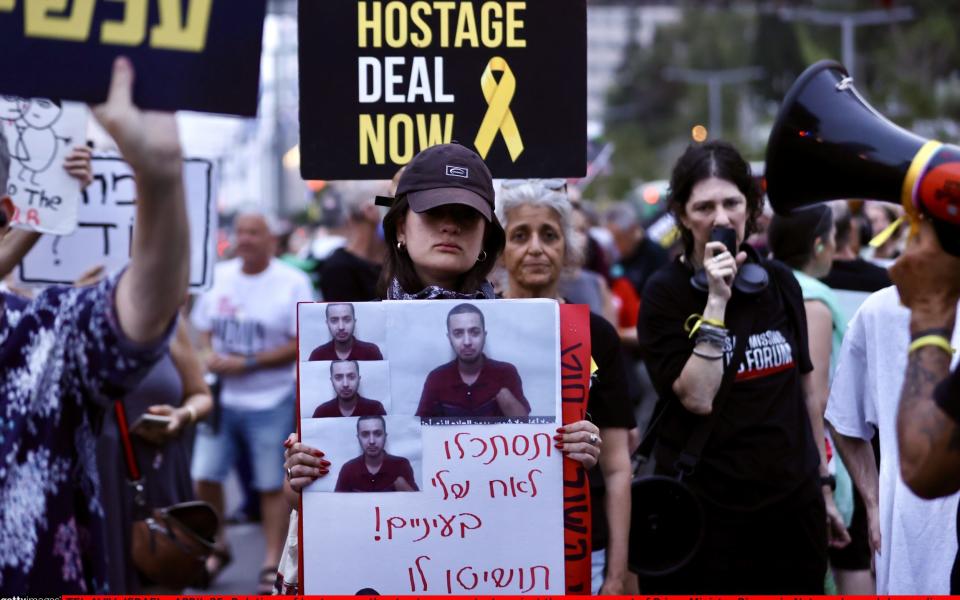Israel’s ceasefire proposal is the best hope yet for peace

- Oops!Something went wrong.Please try again later.
We have been here before, but Israel woke up on Sunday to renewed hope that a ceasefire could be brokered with Hamas and the remaining 139 hostages returned.
Talks have been deadlocked for months over Hamas’s demand that any deal lead to an end to the conflict and Israel’s refusal to countenance anything but “total victory”.
But late on Saturday night, it was reported that a new Israeli proposal, brokered by Egypt, includes a willingness to discuss the “restoration of sustainable calm” in Gaza after an initial release of some 20-30 hostages.
The phrasing mirrors the Islamic concept of “hudna” - an extended peace or calm - and may prove acceptable to both sides as it falls short of having to declare a final peace. The last Israel-Lebanon war of 2006 was wrapped up on similarly ambiguous terms.
The Israeli proposal is understood to deal with other sticking points: it reportedly allows for Gazans to return to their homes in the north and for the withdrawal of IDF troops from Gaza’s central corridor.
It was previously reported that the number of hostages Israel is asking Hamas to release in the initial phase of a ceasefire has also been reduced.
Yet it is the proposal for an extended peace that is likely to make or break the new proposal. The Hamas leadership is considering it and is expected to respond to in the next few days.

“The proposal … includes a willingness to discuss the establishment of a sustainable ceasefire as part of the implementation of the second phase of the deal, which would take place after the release of hostages on humanitarian grounds,” reported the Axios news site on Sunday, quoting Israeli officials.
Hamas “should understand that it is possible that if the first stage is implemented, it will be possible to advance to the next stages and reach the end of the war”, they added.
The reported shift in the Israeli position sparked anger from sources close to Israeli Prime Minister Benjamin Netanyahu on Saturday night who, playing with words, said Israel’s war aims remained unchanged - something the new formulation allows for.
Nevertheless the new deal - if accepted by Hamas - could spark a political crisis in Israel. The extreme Right-wing parties that Netanyahu’s finely balanced coalition relies on have long said they will pull out if he stops the war before Hamas is wholly defeated.
These parties, however, represent only a handful of seats and the opposition Yesh Atid party has said it will step in and support the government if it can secure a deal which sees the return of the missing 139 hostages.
The new offer comes at the end of a week in which Israel has been talking up preparations for a military push into Rafah in the south of Gaza where Hamas’s last four battalions are thought to be dug in. The threat of an Israeli invasion of Rafah remains real and may pressure Hamas to engage constructively with the new deal, say analysts.
Israel is also feeling the heat from the US and other allies who have been ratcheting up the pressure ever since intervening decisively to protect Israel from the Iranian missile barrage two weeks ago.

In addition to pushing home Israel’s dependence on western military aid, talk of sanctions and action by the International Criminal Court in the Hague have been growing steadily louder. Only this week, the UK demanded and secured permission from Israel to inspect the makeshift prisons in which it is detaining Hamas suspects from Gaza.
Carrots are also being offered to the Israeli leadership and defence establishment - with President Biden expected to talk by phone with Mr Netanyahu on Sunday evening ahead of the arrival in Israel of his foreign secretary, Antony Blinken, on Tuesday.
Some say the US is essentially offering Mr Netanyahu the chance to become the face of a new alliance against Iran - something he has long talked of.
“A historic decision point - every decision the Israeli government makes will have far-reaching consequences for its strategic situation for many years to come,” tweeted Shay Har-Zvi, a Senior fellow at the Institute for Policy and Strategy and a former official in the Ministry of Strategic Affairs, as news broke of the new offer.
He added that a deal may pave the way for the advancement of the wider US peace plan for the region, including the rebuilding of Gaza and formation of a “coalition against Iran”.
“On the other hand, another failure could lead to a wide multi-arena escalation,” he said.
Although there is cause for hope, the chances of success remain slim based on recent performance. The political gamble could prove too much for Mr Netanyahu or Hamas could reject the offer, saying it does not go far enough.
“Every time we get close to a deal… there is sabotage taking place… from both sides,” said a top Qatari official in an interview with the newspaper Haaretz on Saturday.
One can only hope that this time it is different.

